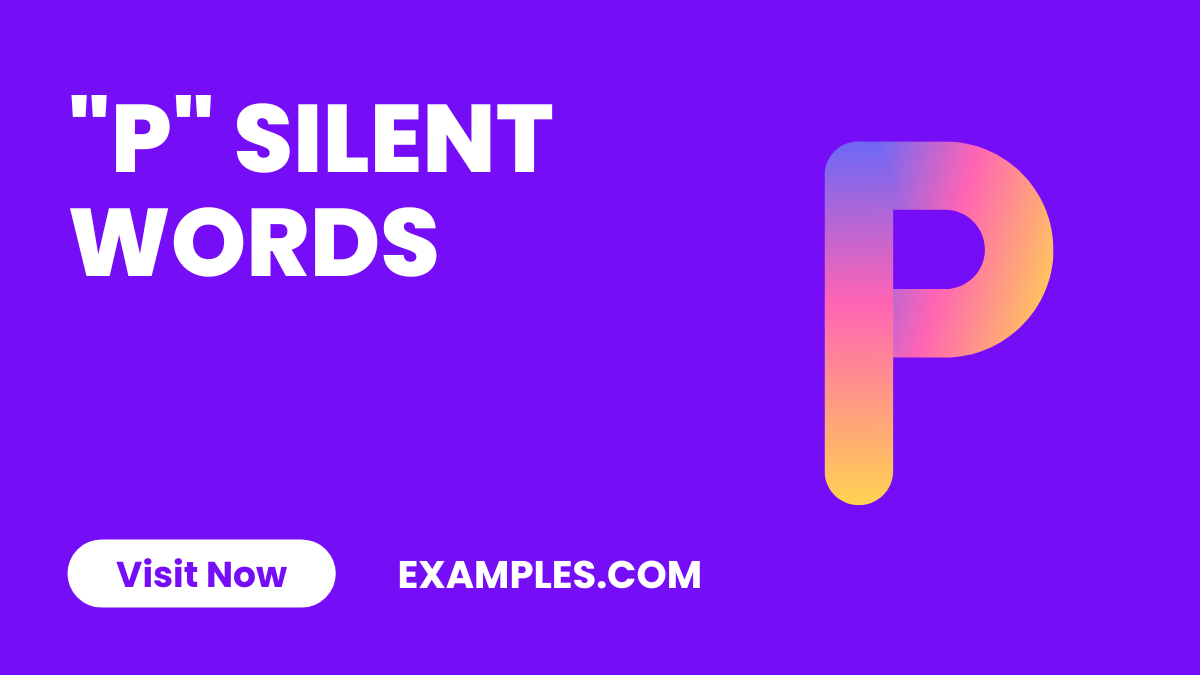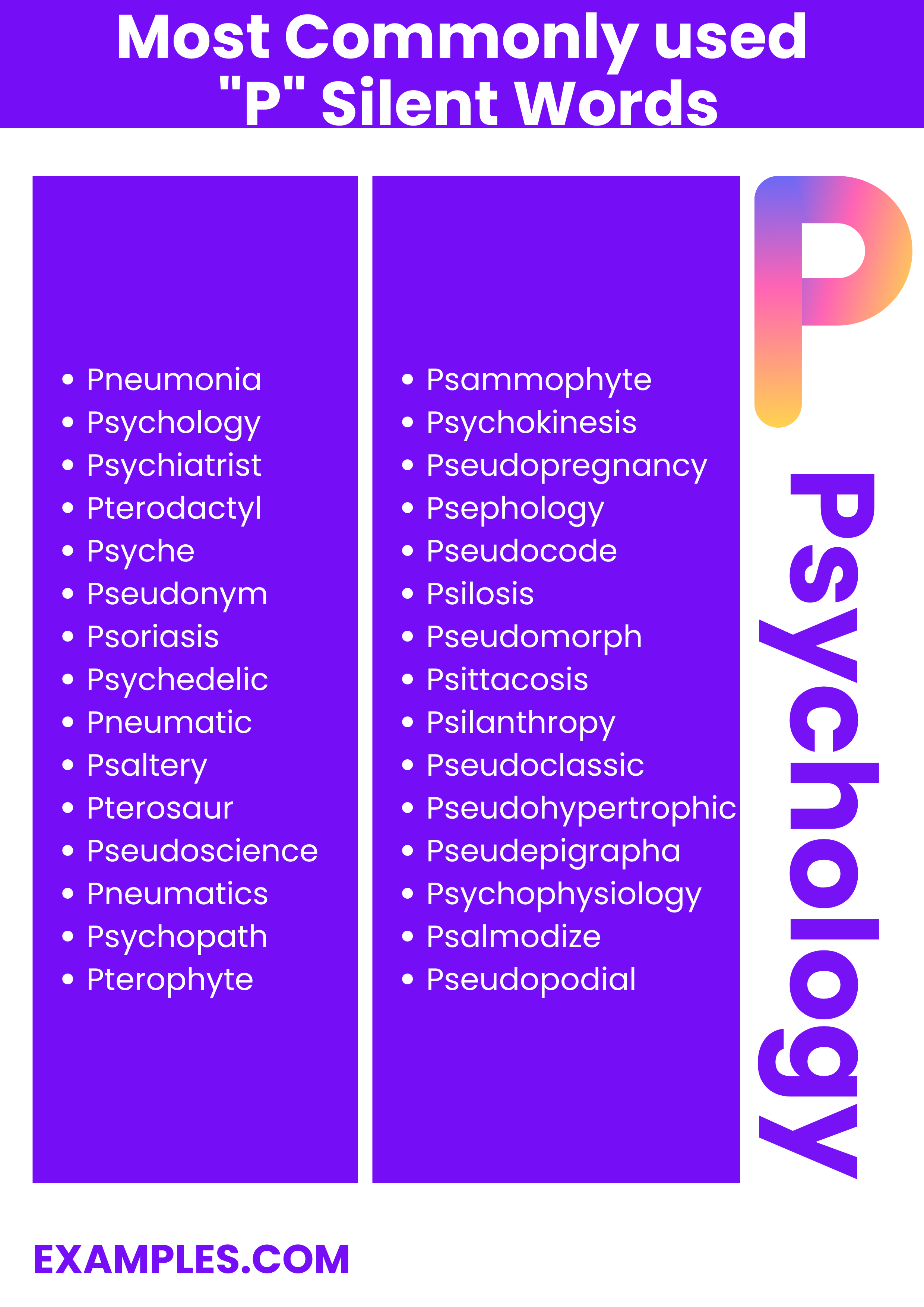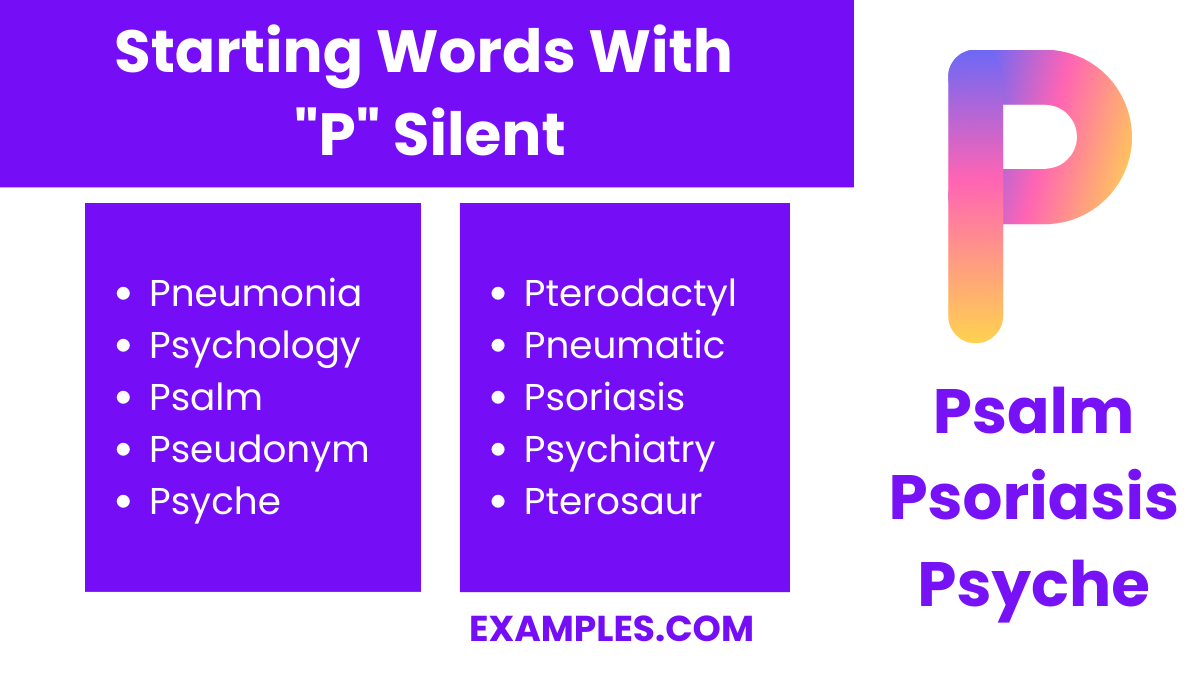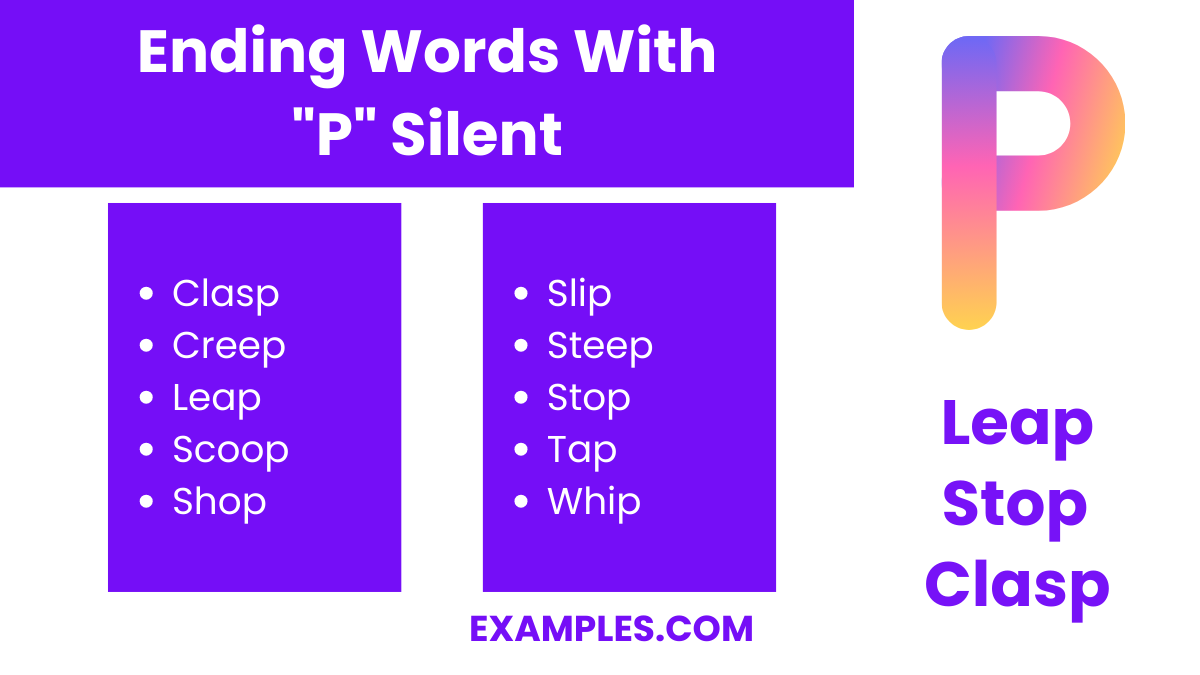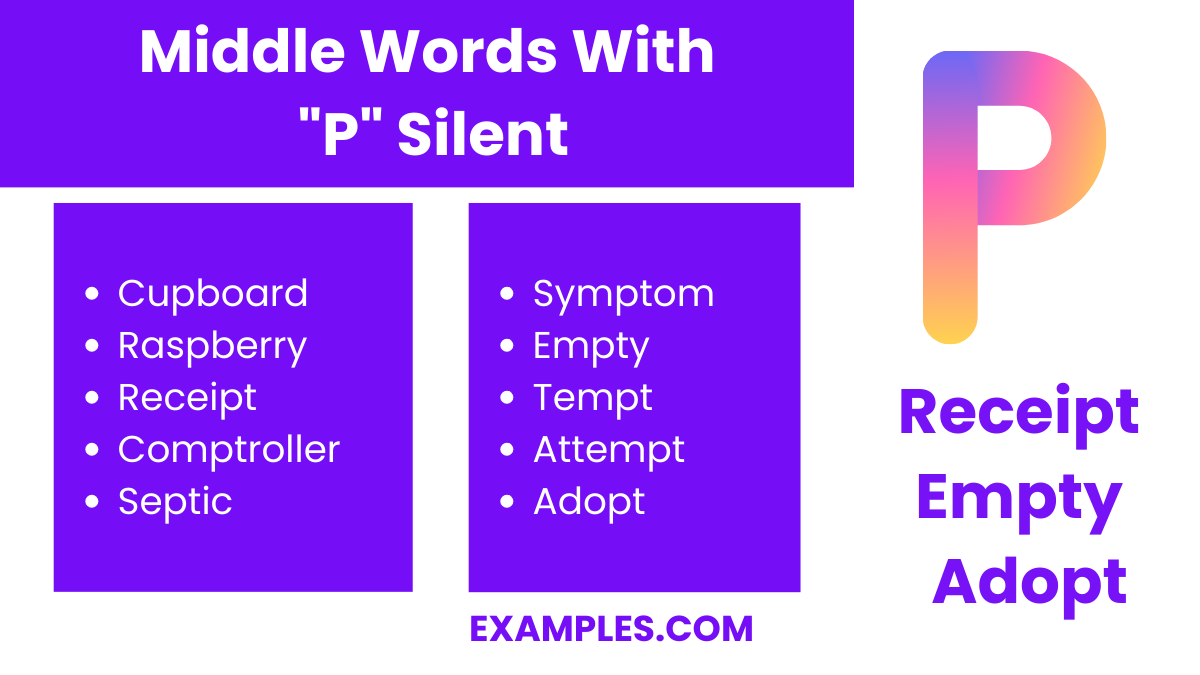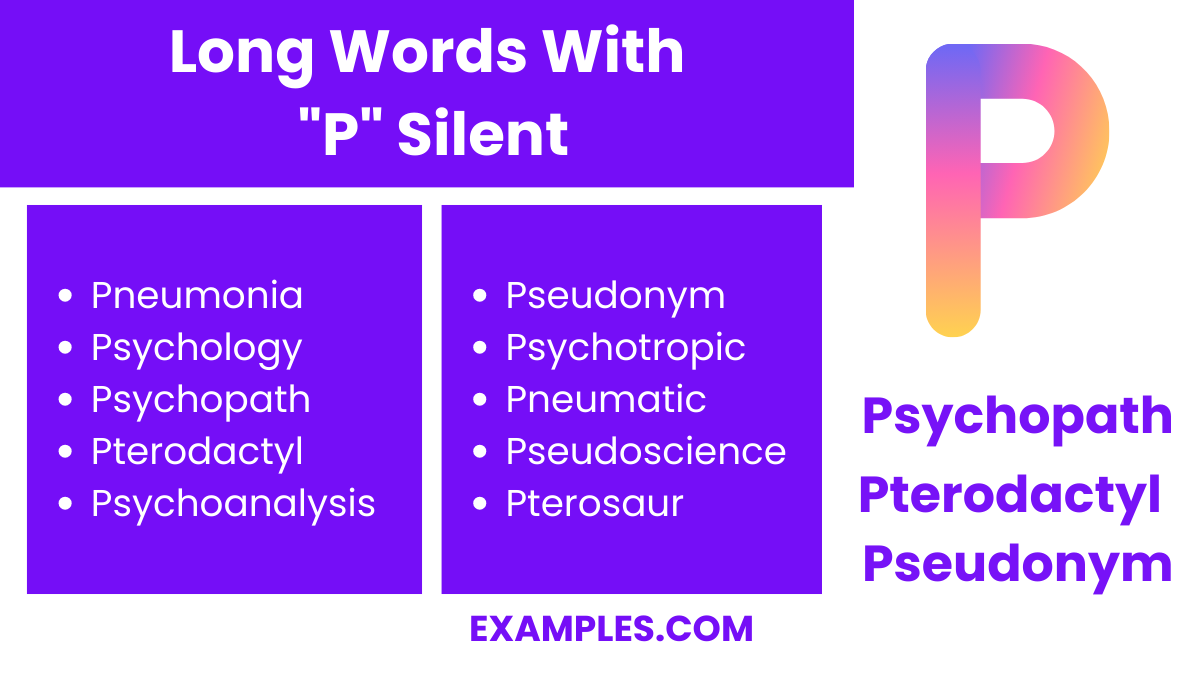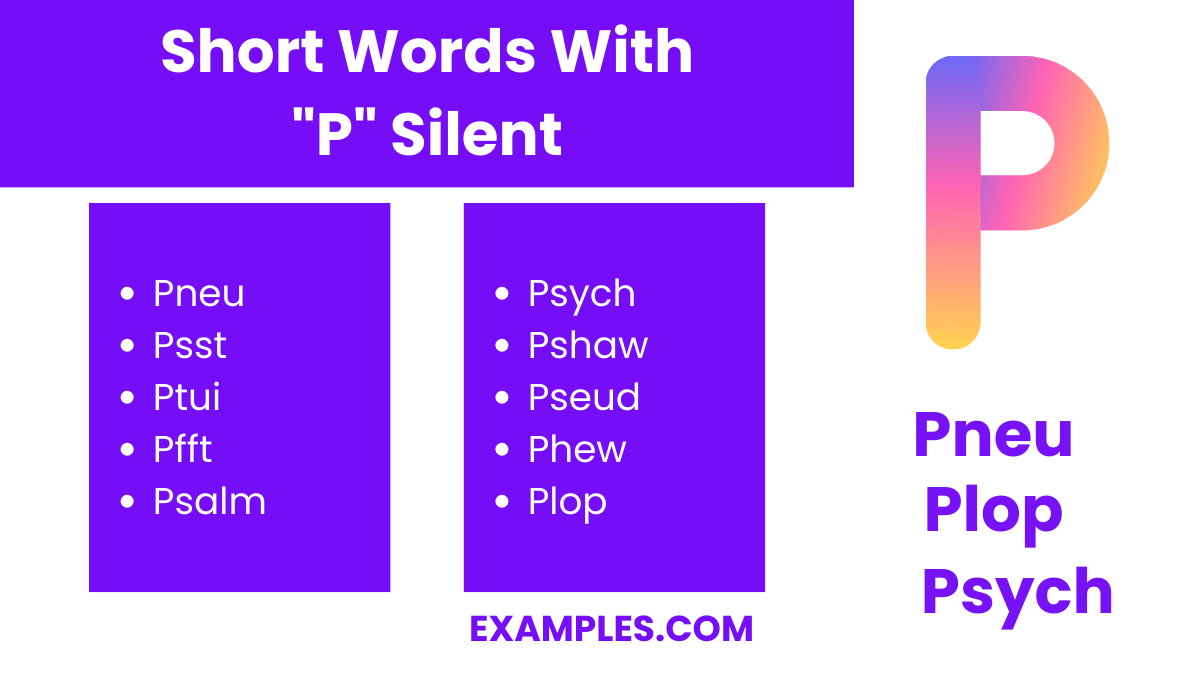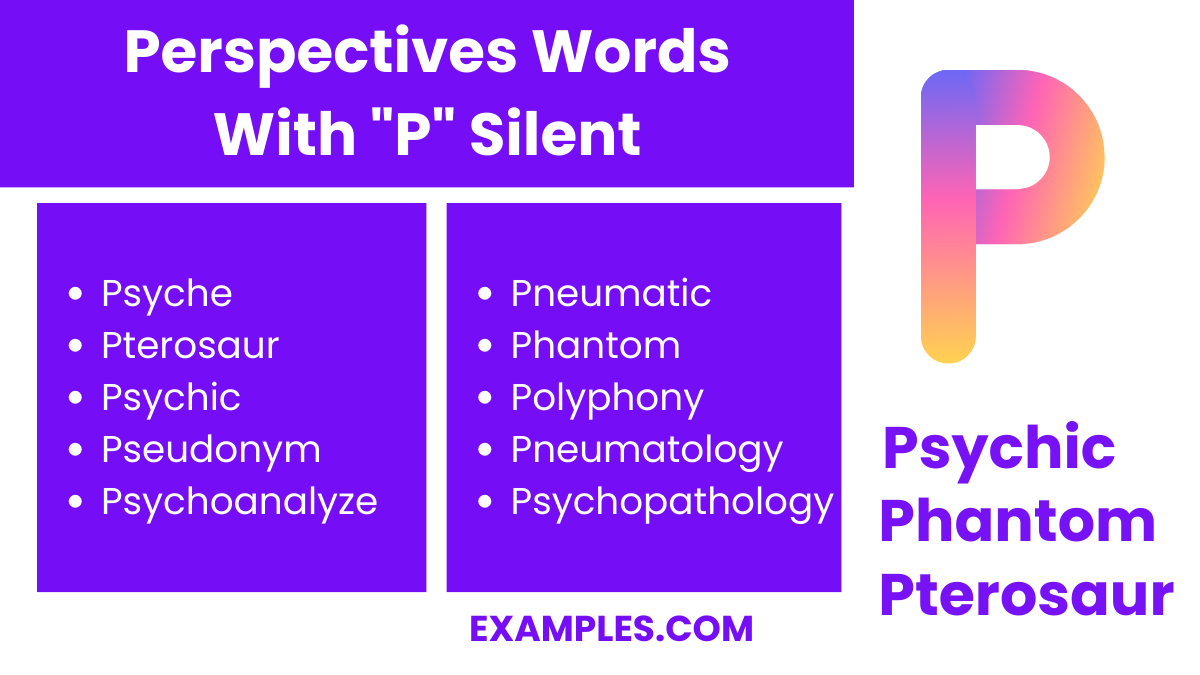“P” Silent Words
The silent “P” in certain English words often goes unnoticed, yet it plays a fascinating role in the tapestry of the language. This unique phonetic feature, found at the beginning of several words, invites curiosity and exploration. From the psychological depths of the human mind to the ancient practice of psalms, the silent “P” words weaves a story of linguistic evolution and cultural influence. Understanding these words not only enriches vocabulary but also offers a glimpse into the quirks that make English a rich and diverse language.
Download Most Commonly Used P Silent Words - PDF
30 Most Commonly used “P” Silent Words
Explore the silent subtleties of English with words where the “P” remains unvoiced, adding an intriguing layer to pronunciation. This selection, ideal for educational purposes, showcases the diversity and complexity of the language, challenging learners to fine-tune their phonetic skills. Each word is an opportunity to delve deeper into English phonology, enhancing both vocabulary and linguistic understanding.
| Word | Phonetic Transcription |
|---|---|
| Pneumonia | /njuːˈmoʊ.ni.ə/ |
| Psychology | /saɪˈkɑː.lə.dʒi/ |
| Psychiatrist | /saɪˈkaɪ.ə.trɪst/ |
| Pterodactyl | /tɛrˈɒd.æk.tɪl/ |
| Psyche | /ˈsaɪ.ki/ |
| Pseudonym | /ˈsuː.də.nɪm/ |
| Psoriasis | /səˈraɪ.ə.sɪs/ |
| Psychedelic | /ˌsaɪ.kəˈdɛl.ɪk/ |
| Pneumatic | /njuːˈmæt.ɪk/ |
| Psaltery | /ˈsɔːl.tə.ri/ |
| Pterosaur | /ˈtɛr.ə.sɔːr/ |
| Pseudoscience | /ˌsuː.doʊˈsaɪ.əns/ |
| Pneumatics | /njuːˈmæt.ɪks/ |
| Psychopath | /ˈsaɪ.koʊ.pæθ/ |
| Pterophyte | /ˈtɛr.ə.faɪt/ |
| Psammophyte | /ˈsæm.ə.faɪt/ |
| Psychokinesis | /ˌsaɪ.koʊ.kɪˈniː.sɪs/ |
| Pseudopregnancy | /ˌsuː.doʊˈprɛɡ.nən.si/ |
| Psephology | /sɪˈfɒl.ə.dʒi/ |
| Pseudocode | /ˈsuː.doʊˌkoʊd/ |
| Psilosis | /saɪˈloʊ.sɪs/ |
| Pseudomorph | /ˈsuː.doʊ.mɔːrf/ |
| Psittacosis | /ˌsɪ.təˈkoʊ.sɪs/ |
| Psilanthropy | /saɪˈlæn.θrə.pi/ |
| Pseudoclassic | /ˌsuː.doʊˈklæs.ɪk/ |
| Pseudohypertrophic | /ˌsuː.doʊ.haɪˌpɜːr.trəˈfɪk/ |
| Pseudepigrapha | /ˌsuː.dɪˈpɪɡ.rə.fə/ |
| Psychophysiology | /ˌsaɪ.koʊˌfɪz.iˈɒl.ə.dʒi/ |
| Psalmodize | /ˈsɑːl.mə.daɪz/ |
| Pseudopodial | /ˌsuː.doʊˈpoʊ.di.əl/ |
Starting Words With “P” Silent
Dive into the intriguing world of English where the “P” starts words but remains unheard, hinting at the language’s complexity and rich history. This silent letter offers a fascinating study for both teachers and students. Incorporating these daily use English words into vocabulary not only sharpens linguistic skills but also enriches communication. Exploring this list provides a peek into this phonetic curiosity, making everyday communication a learning opportunity and revealing the layers of language that we often take for granted. This exploration can transform ordinary language lessons into engaging discoveries of English phonetics.
- Pneumonia (/njuːˈməʊ.ni.ə/) – A lung inflammation caused by infection.
- Psychology (/saɪˈkɒl.ə.dʒi/) – The study of the mind and behavior.
- Psalm (/sɑːm/) – A sacred song or hymn.
- Pseudonym (/ˈsjuː.də.nɪm/) – A fictitious name used by an author.
- Psyche (/ˈsaɪ.ki/) – The human soul, mind, or spirit.
- Pterodactyl (/təˈrɒd.æk.tɪl/) – A prehistoric flying reptile.
- Pneumatic (/njuːˈmæt.ɪk/) – Relating to air or gas under pressure.
- Psoriasis (/səˈraɪ.ə.sɪs/) – A skin disease marked by red, itchy scales.
- Psychiatry (/saɪˈkaɪ.ə.tri/) – The study and treatment of mental illness.
- Pterosaur (/ˈtɛr.ə.sɔːr/) – Another term for a pterodactyl.
Ending Words With “P” Silent
English words that conclude with a silent “P”, especially compound words, offer a unique twist, challenging conventional pronunciation rules. These terms, often of French origin, retain their silent letters as a nod to their etymological roots, providing a fertile ground for linguistic exploration. For educators, these words serve as valuable tools to broaden students’ understanding and appreciation of language diversity. By integrating these into lessons, teachers can enhance students’ vocabulary while delving into the fascinat
- Clasp (/klæsp/) – To grasp something tightly with one’s hand.
- Creep (/kriːp/) – To move slowly and carefully, especially in order to avoid being heard or noticed.
- Leap (/liːp/) – To jump or spring a long way, to a great height, or with great force.
- Scoop (/skuːp/) – To pick up and move (something) with a scoop (a tool or container).
- Shop (/ʃɒp/) – A building or part of a building where goods or services are sold.
- Slip (/slɪp/) – To slide accidentally and lose one’s balance or footing.
- Steep (/stiːp/) – Having a sharp inclination; precipitous.
- Stop (/stɒp/) – To come to an end; cease to happen.
- Tap (/tæp/) – To strike something lightly, especially with a slight sound.
- Whip (/wɪp/) – To beat (someone or something) with a whip or similar instrument.
Middle Words With “P” Silent
Words with a silent “P” nestled in the middle, particularly encouraging words, are linguistic gems that subtly challenge speakers and learners alike. These words, often steeped in history, reflect the dynamic nature of English and its remarkable capacity for absorption and adaptation. For educators, these terms offer a valuable platform to delve into discussions about language evolution and the intricacies of pronunciation, significantly enriching students’ learning experiences. By focusing on these encouraging words, teachers can not only enhance vocabulary but also inspire students with the language’s depth and versatility, fostering a more engaging and positive learning environment.
- Cupboard (/ˈkʌb.ərd/) – A cabinet or closet for storing household goods.
- Raspberry (/ˈræz.bər.i/) – A soft, red fruit with many small seeds.
- Receipt (/rɪˈsiːt/) – A written acknowledgment of having received something.
- Comptroller (/kənˈtroʊlər/) – A management level position responsible for supervising the quality of accounting and financial reporting within an organization.
- Septic (/ˈsep.tɪk/) – Infected with bacteria; relating to sepsis.
- Symptom (/ˈsɪmp.təm/) – A physical or mental feature indicating a condition or disease.
- Empty (/ˈemp.ti/) – Containing nothing; not filled or occupied.
- Tempt (/tempt/) – To entice or try to entice someone to do something.
- Attempt (/əˈtempt/) – To make an effort to achieve or complete something difficult.
- Adopt (/əˈdɒpt/) – To legally take another’s child and bring it up as one’s own.
Long Words With “P” Silent
Dive into the intriguing world of English with long describing words that harbor a silent “P”, an enigmatic characteristic that adds sophistication to the language. These words, often with Greek or Latin roots, provide a rich palette for vocabulary expansion and pronunciation enhancement. Educators can utilize these examples to illuminate the subtle complexities of English, transforming learning into a captivating journey for students. Each word serves as a gateway to exploring fields such as history, science, or psychology, making them invaluable tools for broadening students’ horizons and deepening their understanding of the language’s rich tapestry.
- Pneumonia (/njuːˈmoʊ.ni.ə/) – A lung inflammation usually caused by infection.
- Psychology (/saɪˈkɑː.lə.dʒi/) – The science of behavior and mind.
- Psychopath (/ˈsaɪ.koʊ.pæθ/) – An individual with a chronic mental disorder with abnormal or violent social behavior.
- Pterodactyl (/tɛrˈɒd.æk.tɪl/) – An extinct flying reptile.
- Psychoanalysis (/ˌsaɪ.koʊˈæn.ə.lɪ.sɪs/) – A therapeutic method for treating mental disorders.
- Pseudonym (/ˈsuː.də.nɪm/) – A fictitious name, especially one used by an author.
- Psychotropic (/ˌsaɪ.koʊˈtrɒp.ɪk/) – Pertaining to drugs that affect a person’s mental state.
- Pneumatic (/njuːˈmæt.ɪk/) – Relating to air or other gases.
- Pseudoscience (/ˌsuː.doʊˈsaɪ.əns/) – A collection of beliefs mistakenly regarded as being based on scientific method.
- Pterosaur (/ˈtɛr.ə.sɔːr/) – Winged reptiles that lived during the time of dinosaurs.
Short Words With “P” Silent
Delving into the realm of short words with silent “P” reveals an interesting aspect of English pronunciation, offering a unique opportunity for teachers to engage students with the peculiarities of the language. These words, concise yet rich in meaning, are excellent for lessons focused on phonetic accuracy and spelling.
- Pneu (/njuː/) – Short for pneumatic tire or pneumonia in medical shorthand.
- Psst (/sːt/) – Used to attract someone’s attention quietly.
- Ptui (/ˈtuː.i/) – An expression of disdain or contempt.
- Pfft (/fft/) – An expression of dismissal.
- Psalm (/sɑːm/) – A sacred song or hymn.
- Psych (/saɪk/) – To prepare mentally for a challenging task.
- Pshaw (/ʃɔː/) – An expression of disbelief or impatience.
- Pseud (/sjuːd/) – Short for a pseudointellectual.
- Phew (/fjuː/) – An expression of relief or tiredness.
- Plop (/plɒp/) – A sound of something dropping into water.
Perspectives Words With “P” Silent
Exploring perspectives on consonant words with a silent “P” opens a window into the subtleties and richness of English phonetics. These words, varying in usage and context, serve as a testament to the language’s depth and historical evolution. Teachers can use these examples to foster a deeper understanding of English’s diverse phonological landscape among students, highlighting the intricate interplay between silent letters and spoken sounds. This exploration not only enriches vocabulary but also enhances students’ appreciation for the complexities and nuances of English pronunciation, contributing to a more comprehensive linguistic education.
- Psyche (/ˈsaɪ.ki/) – The human soul, mind, or spirit.
- Pterosaur (/ˈtɛr.ə.sɔːr/) – A large prehistoric flying reptile.
- Psychic (/ˈsaɪ.kɪk/) – Relating to the human mind or supernatural phenomena.
- Pseudonym (/ˈsjuː.də.nɪm/) – A fictitious name used by an author.
- Psychoanalyze (/ˌsaɪ.kəʊˈæn.ə.laɪz/) – To treat mental and emotional disorders by investigating the interaction of conscious and unconscious elements in the mind.
- Pneumatic (/njuːˈmæt.ɪk/) – Relating to air or gas under pressure.
- Phantom (/ˈfæn.təm/) – A ghost or an apparition.
- Polyphony (/pəˈlɪf.ə.ni/) – Music with two or more independent melodic parts sounded together.
- Pneumatology (/ˌnjuː.məˈtɒl.ə.dʒi/) – The study of spiritual beings and phenomena.
- Psychopathology (/saɪˌkɒ.pəˈθɒl.ə.dʒi/) – The study of mental disorders.
In conclusion, words with a silent “P” exemplify the intriguing complexities of English pronunciation, challenging learners and speakers alike. These words, rooted in diverse linguistic origins, enrich our vocabulary and offer fascinating insights into the history and evolution of the language, underscoring the importance of nuanced phonetic awareness in mastering English.


